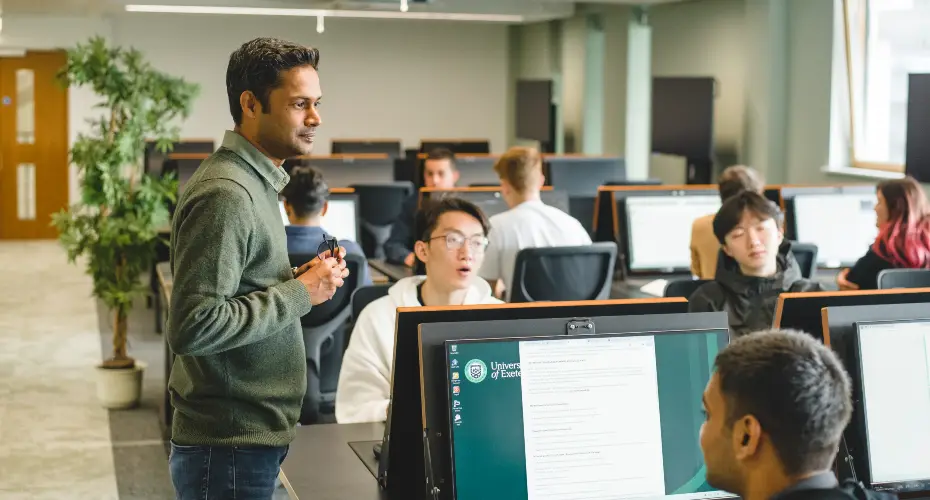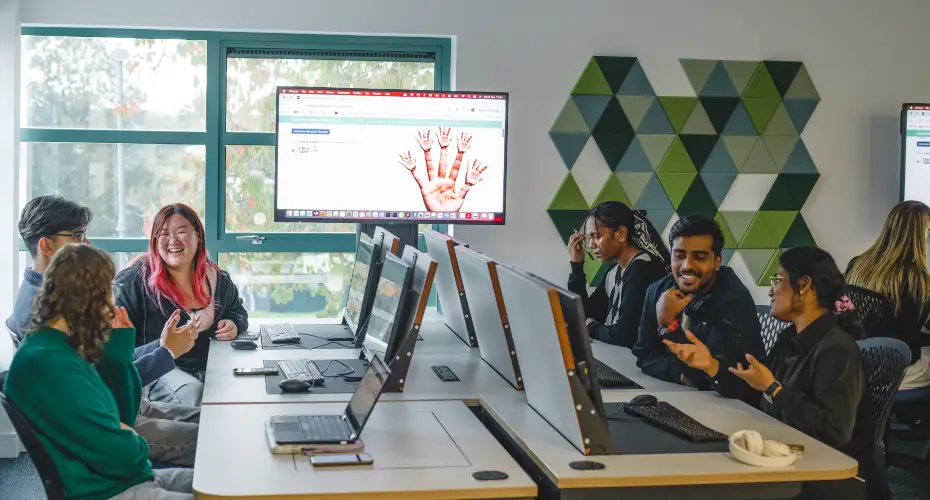| UCAS code | 1234 |
|---|---|
| Duration | 1 year full time |
| Entry year | January 2026 |
| Campus | Streatham Campus |
| Discipline | Mathematics |
| Contact |
| Typical offer | A good degree (normally a 2:2 or above). |
|---|---|
Overview
- This programme is co-created and co-delivered by the department of Mathematics & Statistics and the department of Computer Science. It combines perspectives from both disciplines giving you a unique insight into modern statistical data science and the opportunity to begin your studies in January.
- Our Statistical Data Science MSc is a conversion course, developed for students from a variety of backgrounds to gain essential knowledge, skills, and competencies to thrive in the rapidly evolving field of data science.
- Benefitting from the skills and experience of both our Mathematics and Statistics department and our Computer Science department, you will study advanced statistics, learn to programme in Python and R and bring together these skills to investigate data. No prior experience of programming is required.
- In addition to the technical aspects of data science and statistics, you will examine the ethical issues related to the use of data in contemporary society, ensuring your scientific rigour is underpinned by responsibility and integrity.
- Our programme offers you the opportunity to apply your skills to a variety of sectors, including industry, medicine and healthcare, environment and climate.
- Your learning will be applied to real-world problems in your dissertation preparing you for work as a rigorous data scientist or analyst with a fundamental understanding of the statistics at the heart of the data you investigate either in a commercial setting or further postgraduate study.
![]()
Top 20 in the UK for Mathematics and Computer Science
18th for Mathematics and 19th for Computer Science in the Complete University Guide 2025
![]()
Long-established partnership with the Alan Turing Institute and home to the Institute of Data Science and Artificial Intelligence
![]()
Excellent facilities spanning a wide range of machine types and software ecosystems alongside world-class computer science labs
![]()
Top 20 in the UK for Mathematics and Computer Science
18th for Mathematics and 19th for Computer Science in the Complete University Guide 2025
![]()
Long-established partnership with the Alan Turing Institute and home to the Institute of Data Science and Artificial Intelligence
![]()
Excellent facilities spanning a wide range of machine types and software ecosystems alongside world-class computer science labs
Entry requirements
A good degree (normally a 2:2 or above).
Successful applicants will usually have at least an A-level or equivalent in Mathematics and/or have received quantitative skills training as part of their undergraduate programme or professional experience.
Please also see our guidance on essential documentation required for an initial decision on taught programme applications.
Entry requirements for international students
English language requirements
International students need to show they have the required level of English language to study this course. The required test scores for this course fall under Profile B2. Please visit our English language requirements page to view the required test scores and equivalencies from your country.
Course content
This programme supports individuals with a non-mathematical or computing background who aspire to transition into the field of data science. We provide a background in the necessary mathematics and statistics, as well as equipping you to use machine learning, data model and code in a variety of languages (such as Python and R). No prior experience of programming is required.
Our data governance and ethics module is essential to this programme – you will learn from colleagues in our faculty of Humanities, Arts and Social Sciences how the complex technologies behind data science can be managed and governed for the benefit of society now and in the future, as well as exploring your responsibility as a data scientist for ensuring that data and the technologies used to harvest and analyse it are used ethically.
The MSc includes applications across a wide variety of sectors and helps you to develop innovative and responsible approaches to the use of data.
You will develop advanced-level mathematical, statistical, machine learning and computing skills to enable you to draw and utilise insights from data sets to inform business decisions.
In term one (January to March) you will study:
- Working with Data (MTHM501)
- Programme with Python (COMM109)
- Data Governance and Ethics (SOCM033)
- Introduction to Data Science and Statistical Modelling (MTHM502)
In term two (May to July) you will study:
- Applications of Data Science and Statistics (MTHM503)
- Statistical Data Modelling (MTHM506)
- Machine Learning (ECMM422)
- Social Networks and Text Analysis (ECMM447)
You will work on your final project (dissertation) during Term 3 (September to December). You can submit your own project idea or take up an idea proposed by an external organisation, supervisors from the Statistical Data Science teaching team or from colleagues across the University such as from our Centre for Computational Social Science (C2S2).
The modules we outline here provide examples of what you can expect to learn on this degree course based on recent academic teaching. The precise modules available to you in future years may vary depending on staff availability and research interests, new topics of study, timetabling and student demand.
Compulsory modules
| Code | Module | Credits |
|---|---|---|
| COMM109 | Programme with Python | 15 |
| ECMM422 | Machine Learning | 15 |
| ECMM447 | Social Networks and Text Analysis | 15 |
| MTHM064 | Dissertation Project | 60 |
| MTHM501 | Working with Data | 15 |
| MTHM502 | Introduction to Data Science and Statistical Modelling | 15 |
| MTHM503 | Applications of Data Science and Statistics | 15 |
| MTHM506 | Statistical Data Modelling | 15 |
| SOCM033 | Data Governance and Ethics | 15 |
Fees
January 2026 entry
UK fees per year:
£13,700 full-time
International fees per year:
£29,100 full-time
Scholarships for January Start
Our Exeter Excellence Scholarships are also available for applicants looking to study with us in January 2026 and applications for these scholarships will open in September.
Scholarships
The University of Exeter has many different scholarships available to support your education, including £5 million in scholarships for international students applying to study with us in the 2025/26 academic year, such as our Exeter Excellence Scholarships*.
For more information on scholarships and other financial support, please visit our scholarships and bursaries page.
*Terms and conditions apply. See online for details.
Teaching and research
Artificial Intelligence at Exeter
Teaching on this degree is directly influenced by research undertaken within Exeter’s Institute for Data Science and Artificial Intelligence which provides a hub for data-intensive science and artificial intelligence activity within the University.
The institute’s vision for data science is to find new means of interrogating and understanding data and to apply cutting-edge data analytical methodologies to diverse questions. It is a truly interdisciplinary research community made up of data scientists, mathematicians, and computer specialists across many of Exeter’s research groups and departments.
Learning and Teaching
Teaching on this programme is delivered through a mix of lectures, projects, group work and hands-on lab sessions. Many of your lectures will be interactive combining a blend of classroom learning, coding and data analysis. Group and individual projects will be undertaken using real data and will often focus on topical challenges which are the focus of current research.
Investment in data science and artificial intelligence
The University has invested £50 million in the development of its Data Science and Artificial Intelligence capabilities. The Accelerating Data Science and Artificial Intelligence (ADA) project has been running since 2023 and has invested in teaching, research and infrastructure which this programme benefits from.
Internationally recognised research
We believe every student benefits from being taught by experts active in research and practice. All our academic staff are active in internationally-recognised scientific research across a wide range of topics. You will discuss the very latest ideas, research discoveries and new technologies, becoming actively involved in a research project yourself.
Academic partners
Our long-established partnership with the Alan Turing Institute, the UK’s national institute for data science and artificial intelligence, means that we have strong connections to the UK AI research community. Currently we host 11 Turing Fellows and one Turing AI Fellow at the University. Turing Fellows are established scholars with proven research excellence in data science, AI, or a related field. Lectures, conferences and seminars organised by Turing and the Turing University Network are usually open to our students to attend either in person or online.
Supportive environment
We aim to provide a supportive environment where students and staff work together in an informal and friendly atmosphere. We operate an open door policy, so it is easy to consult individual members of staff or to fix appointments with them via email. As a friendly group of staff, you will get to know us well during your time here.
Assessments
The assessment strategy for each module is explicitly stated in the full module descriptions given to students. Group and team skills are addressed within modules dealing with specialist and advanced skills. Assessment methods include essays, closed book tests, exercises in problem solving, use of the Web for tool-based analysis and investigation, mini-projects, extended essays on specialised topics, and individual and group presentations.
Facilities
World-class facilities
Our latest computing facilities are world-class spacious teaching labs allowing comfortable, collaborative working in a sensory-friendly environment.








Careers
Data Science is changing the way people do business. Mountains of previously uncollectable data, generated by huge growth in online activity and appliance connectivity, is becoming available to businesses in every sector. The opportunities for businesses and individuals who can manage, manipulate and extract insights from these enormous data sets are limitless. A direct result of this is the dramatic increase in demand for individuals with the skills to turn this information into insight is outstripping supply.
Graduate destinations
You will graduate with the skills and confidence to apply sophisticated data science methods in a wide variety of settings and interpret the results as a data scientist or analyst. This conversion course produces graduates who are not only skilled in their undergraduate discipline, but also in statistical data science, which is a potent and highly employable combination.
Dedicated careers support
You will receive support from our dedicated Career Zone team, who provide excellent career guidance at all stages of career planning. The Career Zone provides one-on-one support and is home to a wealth of business and industry contacts. Additionally, they host useful training events, workshops and lectures which are designed to further support you in developing your enterprise acumen. Please visit the Career Zone for additional information on their services.












